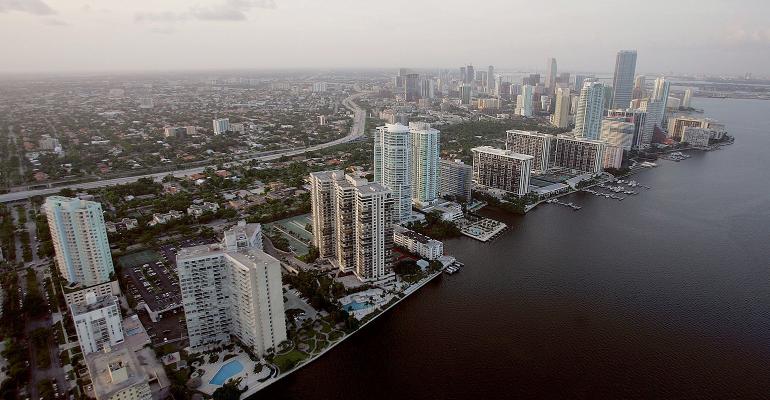By Felipe Marques and Cristiane Lucchesi
(Bloomberg) --Banco Bradesco SA, Brazil’s second-biggest bank by market value, is joining competitors branching out in Miami Beach as it seeks to tap a multibillion-dollar pool of money Brazilians had been keeping under wraps.
The bank will open an office in the South Florida city in July to serve wealthy Brazilian clients, Octavio de Lazari Jr., a managing officer at Bradesco, said in an interview at the company’s headquarters in Osasco.
Miami is a destination of choice for many Brazilians given its proximity to Latin America, cultural identity and similar climate. Brazilian financial institutions including Itau Unibanco Holding SA, Grupo BTG Pactual and XP Investimentos CCTVM SA already have offices there. But a recent tax-amnesty program created new opportunities as many investors brought their now legalized fortunes from fiscal havens to the city.
Brazil passed a bill last year allowing citizens and companies to report undeclared assets held abroad. After paying a fine and taxes, they could either keep those assets outside the country or bring them home. The program ended on Oct. 31, with more than 25,000 individuals and 103 companies declaring a total of $52.3 billion in foreign deposits, according to the Brazilian tax authority. A second phase of the program kicks in this year.
“Less than 30 percent of the money legalized in the Brazilian tax-amnesty program came to Brazil,” Lazari said.
European Costs
Some of the rest is making its way to Miami.
“The costs to keep an account open in Miami for a wealthy client is lower than in Europe,” said Carlos Gribel, head of fixed income at Andbanc Brokerage in the city. Brazilian clients are also sending more of their investments to South Florida because they have houses there or go there often on vacations, he said.
Joao Albino Winkelmann, director of Bradesco’s private bank, said he predicted the tax-amnesty program would make 2016 a banner year for wealth management in Brazil, as clients brought overseas funds back home.
“I was wrong,” Winkelmann said in an interview. “On the contrary: A lot of clients even spent their local savings to pay the taxes and penalties to declare the foreign assets, then kept them abroad.”
Edison Antonelli will be general manager of Bradesco’s Miami office, Luiz Alberto Attarian will be the private-banking officer and a third executive will be named in coming months, according to the company. Bradesco, which already has private-banking units in New York, Luxembourg and the Cayman Islands, is also adding an adviser, Vanessa Leoni, at the London office.
The push abroad comes on the heels of Bradesco’s purchase last year of HSBC Holdings Plc’s Brazilian unit. “The demand for a Miami office always existed, but the HSBC acquisition encouraged us to be more international,” Winkelmann said.
Market Expansion
Brazil’s private-banking industry expanded almost 17 percent last year, with a total of 831.6 billion reais ($260 billion) in outstanding investments from wealthy individuals as of December, according to the most recent data from the capital-markets association, Anbima. But Winkelmann said net new money increased by just 2.5 percent once you exclude expansion created by the country’s average base interest rate, which was 14.25 percent for most of last year.
“In 2016, there were many individuals moving money from their private banking accounts to invest in their own companies, to solve cash-flow problems,” Winkelmann said.
Bradesco outgrew its peers despite those headwinds, as its private-banking business expanded 20 percent last year not including the HSBC purchase. Including the 2,500 private-banking clients it got from that acquisition, growth was 36 percent, according to Winkelmann. Growth could be about 17 percent this year, if initial public offerings, mergers and other “liquidity events” for individuals pick up speed, he said.
Bradesco is also overhauling how it classifies internally its local high-income clients. Its Prime Invest option will serve customers with 100,000 reais to 1 million reais invested with the bank and the Prime Top Tier offering will cover those with 1 million reais to 5 million reais.
“This structure was brought with HSBC,” Lazari said, adding that the arrangement generates more revenue per client by making it easier to sell more complex, and more expensive, products.
To contact the reporters on this story: Felipe Marques in Sao Paulo at [email protected] ;Cristiane Lucchesi in Sao Paulo at [email protected] To contact the editors responsible for this story: Peter Eichenbaum at [email protected] Steve Dickson, Dan Reichl





